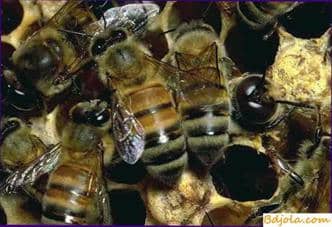Bee venom in folk medicine

Long-term observations and collected personal data on the state of health of beekeepers have shown that bee venom is a good remedy for certain diseases and has preventive properties. However, it should be remembered that with mismanagement, bee venom can bring irreparable harm. In vain are beekeepers, and some doctors consider bee venom as a remedy for all diseases.
Without theoretical justification, practical testing in the experiment and without sufficient clinical observations, it is impossible to recommend stinging for treatment; this is not only dangerous for the health of patients, but sometimes threatens their lives. Apitoxin therapy should be conducted under the supervision of a knowledgeable and experienced physician and in many cases in a complex of therapeutic and prophylactic measures, such as physiotherapy, diet, medication, etc.
A clear drop of poison has healing and poisonous properties, depending on the dose; has a quick effect on the body. Between the therapeutic, toxic (toxic) and lethal dose there is a huge difference. The toxic dose of bee venom is dozens of times, and the lethal dose is hundreds of times more therapeutic.
The sensitivity of the organism to bee venom is different: the most sensitive to it are women, children and the elderly. Usually 1-5 or even 10 simultaneous bee stings are transferred by a healthy person easily and cause only a minor local reaction in the form of redness of the skin, swelling, burning sensation, etc.
But 200-300 simultaneous seizures cause poisoning of the body with characteristic signs of disturbance, mainly from the cardiovascular and nervous systems (shortness of breath, cyanosis, increased heart rate, convulsions, paralysis); 400-500 or more stings cause death, most often as a result of paralysis of the respiratory center.
There are people who are hypersensitive to bee venom: one sting is enough to cause them
Long-term and numerous observations show that beekeepers working with bees for a long time, tolerate their stinging without any harm to the organism (individual beekeepers with a long history of work endured the stinging of many bees without any symptoms of poisoning).
Some beekeepers and even medical workers believe that bee venom cures all diseases. On this basis, they apply it for gynecological, children’s and even mental illnesses. However, it should be remembered that in a number of diseases the use of bee venom is contraindicated. According to Soviet legislation, people who do not have medical education are prohibited from doing medical practice. Treatment with bee venom can only be carried out by a doctor.
The material collected by the author (questionnaires, letters), as well as long-term observations, convince us that stinging bees or introducing apitoxin contribute to the development in the human body of immunity not only to bee venom, but also to certain infections. Bee venom, when properly applied, is a curative and prophylactic drug that does not work on a separate organ and not only for a certain disease, but for the whole organism.
Apitoxin, hitting the body, contributes to the mobilization of its defenses. This, to a certain extent, can explain why beekeepers working in the apiary for many years have good health and live long. They develop immunity (immunity) to various diseases.
Data from questionnaires obtained from apiaries show that almost a third of beekeepers are immune to bee venom after working in the apiary during the year, and only about 6% of beekeepers do not acquire immunity. It should immediately be made a reservation that immunity to bee stings in beekeepers often disappears after a break (prolonged) in work at the apiary.
Bee venom in folk medicine
